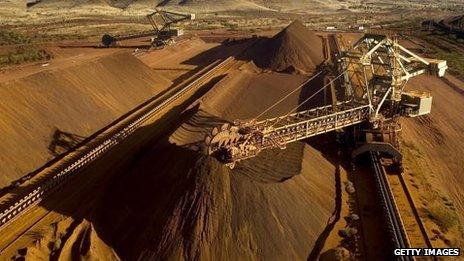Glencore Xstrata writes down $7.7bn in assets
- Published

It is the first earnings report from Glencore Xstrata since the two firms merged
Newly-formed mining giant Glencore Xstrata has written down the value of Xstrata's assets by $7.7bn (£4.9bn), and reported a drop in revenues.
The firm, which was created in May, said the write-down reflected tougher conditions in the mining sector.
Revenues in the first half of 2013 fell 2% to $121.4bn. The firm recorded, external an $8.9bn loss due to the write-downs.
The sector has been hit by falling metals prices, and rival BHP Billiton posted, external a 30% fall in full-year profits.
The fall in prices for industrial metals has come as demand from China has softened, as the country's economy slows and reins in its four-year-long construction boom.
'Heightened risks'
In its first set of results, external since the merger between Glencore and Xstrata was completed, the firm said that metal prices had fallen by 15% on average during the first six months of 2013.
The company said the write-down of Xstrata's assets was a result of the "broader negative mining environment" during the first half of the year, and "heightened risks" to major expansion projects.
"Xtrata had a long history of acquisitions," said Andrew Latto, senior analyst at stock market research company Fat Prophets.
"[Glencore] took over the company in May and they're trying to focus on where they see the value and write down assets that they don't see having value going forward."
In addition to the Xstrata write-down, the firm also took a $452m hit on nickel operations in Australia and a £324m write-down on its share in Russian aluminium firm Rusal.
Ignoring the one-off costs associated with the write downs, the company still saw its underlying profits fell by a third in the first half of the year, to $1.2bn from the combined profit of $1.8bn earned by the two companies a year earlier.
Nonetheless, Glencore said that the progress in integrating Xstrata had "exceeded its expectations", and cost savings would be "materially in excess" of the previous guidance of $500m a year.
Last month, the company suspended its iron ore mining Australian due to weak demand and rising costs.
It also announced that it had begun the sale of its Las Bambas copper mine in Peru to comply with demands from the Chinese authorities.
The sale of its entire stake in the mining project was required by the Chinese Ministry of Commerce as a condition for allowing Glencore's merger with Xstrata.
Rebalancing
Separately, Anglo-Australian miner BHP Billiton reported a 30% fall in net profits to $10.9bn for the year to 30 June.
It said it had cut operating costs by $2.7bn over the 12 months, but this was "more than offset" by falling metals prices.
"Economic conditions over the second half of the 2013 financial year were affected by lower-than-expected growth in emerging economies," the company said.
"Weaker trade and soft manufacturing activity pulled growth rates slightly below expectations in China."
BHP added that it expected commodity prices to remain under pressure in the short term, particularly as China rebalances its economy away from industry and construction, and towards consumer spending.
"The growth rates for steel demand in Asia are expected to moderate as the Chinese economy gradually rebalances," it said.
"This rebalancing should support growth in demand for other industrial metals, energy and agricultural products."
- Published17 July 2013
- Published16 July 2013
- Published29 April 2013
- Published16 May 2013
- Published19 February 2013